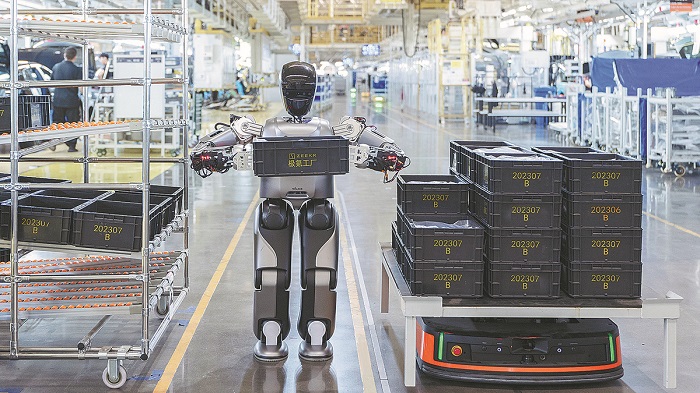Better policy seen as driving innovation

A humanoid robot works on the production line of a factory in Ningbo, Zhejiang province. ZHENG XUEXIONG/FOR CHINA DAILY
More policies are expected to stimulate innovation among businesses, enabling them to cultivate unique competitive advantages in response to the intense price-focused competition prevalent in certain industries, said analysts.
They also anticipate the introduction of a broader range of fiscal tools to alleviate the financial burden on companies arising from their innovation spending.
The remarks came as a key priority for the upcoming year, highlighted at the recent tone-setting Central Economic Work Conference, is to construct a modern industrial system and address problems stemming from hypercompetition while regulating the actions of local governments and enterprises, marking the inaugural acknowledgment of growing hypercompetition at the conference.
Analysts said such competition often involves a one-sided pursuit of low prices in seeking a competitive edge over peers. Some companies, despite their limited capabilities, continuously vie for land and resources to benefit from policy incentives that were rolled out to boost emerging industries' development. And some local governments overemphasize the development of emerging industries regardless of their industrial foundation, thereby risking issues like redundant infrastructure construction and inefficient use of financial resources.
Such a scenario is exemplified by the development of the photovoltaic and power storage industries. The latest data from the China Photovoltaic Industry Association show that despite significant year-on-year growth of production volumes of key components like polycrystalline silicon, silicon wafers, cells and modules — all of which exceeded 20 percent in the first 10 months — prices for these components have experienced substantial drops, with polycrystalline silicon falling by over 35 percent, wafers in excess of 45 percent, and cells and modules by over 25 percent.
During the same period, the output value of the PV manufacturing sector plummeted 43.17 percent year-on-year, totaling around 781.1 billion yuan ($107.1 billion).
Wei Jigang, deputy director-general at the Institute for Market Economy, Development Research Center of the State Council, highlighted the inefficiencies in resource allocation within certain industries, particularly in some heavy industries and emerging sectors navigating through supply-demand imbalances and surplus outdated capacity, resulting in a continuous decline in investment efficiency.
Wei said that technological innovation is crucial to tackling such challenges.
However, the push for such innovation among enterprises brings significant cost pressures, necessitating policy support to enhance innovation efforts while maintaining stable operations.
Yu Xiang, chief analyst of policy research at CITIC Securities, anticipates a comprehensive increase in quotas for fiscal tools supporting the real economy by 2025, with potential funds directed toward industrial upgrades driving new infrastructure and high-end manufacturing development.
Charlie Zheng, chief economist at Samoyed Cloud Technology Group Holdings, also stressed the pivotal role of technological innovation and industrial upgrading.
Zheng called for more policies to guide photovoltaic firms to prioritize technological innovation over mere capacity expansion, improve product quality and reduce production costs. He also said energy storage industry policies should encourage innovation and upgrading to bolster core competitiveness.
To strike a balance between enterprises' innovation investment and operational pressures, Zheng proposed bolstering financial support for innovation using strategies such as establishing a standardized coordination mechanism for financial backing of technological advancements. This includes promoting innovative financial products like enterprise innovation credit loans. Opening up major national research infrastructure to private businesses is also deemed critical.
Zhou Maohua, a researcher at China Everbright Bank's financial markets department, said hypercompetition in certain sectors is a reflection of recent macroeconomic fluctuations and insufficient effective demand, leading to irrational product pricing from businesses to increase market share.
"Looking ahead, more efforts are needed to promote efficient resource allocation, enact legislation to promote healthier industry competition and foster a fairer, transparent and regulated business environment," he added.
liuyukun@chinadaily.com.cn
Copyright © Hechi Municipal People's Government. All rights reserved.
Presented by China Daily.
京ICP备13028878号-6





